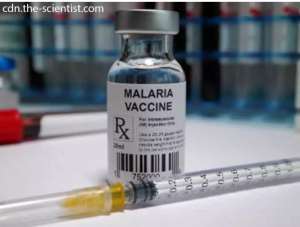
Many Ghanaians are grappling with fear and cynicism about the ongoing anti-malaria vaccination following concerns of major side effects. There are some religious groups who are against the exercise hence warning some sections of the public not to take part.
President of the coalition of NGOs in Health, Dr. Gabriel Bernaku has highlighted the need for Ghanaians to happily embrace the new malaria vaccines being implemented by the Ministry of Health (MoH) and the Ghana Health Service (GHS) as a means to curb malaria in children in the country.
His comments came after rumors went viral on social media that the vaccines were yet to be tried in the three countries and therefore sought to discourage parents to embrace the programme.
What we know is that we have followed this for over ten years and I can say the trial of the vaccines is over. So if it is really true the conversation is about the vaccines, then it is a beneficial venture for Ghana. The truth is, yearly, six million children are delivered and it is the responsibility of the government to protect the children so the introduction of the vaccines is in order, he stated.
According to the MoH, Ghana was selected together with the two countries (Kenya and Malawi) to implement the use of Malaria vaccines as part of Ghana Health Service (GHS) routine vaccinations because of the country’s strong Expanded Immunization Programme (EPI), well organized National Malaria Control Programme, organized Health Systems, etc.
The RTS, S or Mosquirix vaccine is an injectable developed to protect the plasmodium falciparum malaria in children from 6 months to 2 years. The plasmodium falciparum, is the predominant malaria parasite which causes 80 to 90 percent of severe morbidity and mortality mostly in children under 5 and pregnant women. In Ghana, malaria causes about 2,000 deaths annually, approximately 48% of them children under the age of 5. The vaccine has come as an additional tool of the intervention to accelerate the country’s efforts towards control and elimination of the diseases.
Being a 4 dose injections given at 6, 7, 9 months and 2 years, It is expected to avert at least 50,000 malaria cases and save approximately 750 children per year for the next two to three years in the intervention areas. The vaccine stimulates the body’s own immune system to defend it against malaria by preventing the parasite from infecting, maturing and multiplying in the liver.
The goal of the RTS, S pilot, according to the director, public health division of the Ghana Health Service, Dr. Badu Sakodie is to access feasibility, safety and impact of the vaccine in the context of routine use alongside other currently recommended malaria control measure. According to the GHS, it has gone through all the necessary quality controls and tests from its inception till date and registered with the Food and Drugs Authority (FDA).
The Director General of the Ghana Health Service, Dr. Anthony Nsiah Asare the FDA has authorized the use of the drugs in the six selected regions namely: Volta, Oti, Ahafo, Bono, Bono East and Central.
“The selected districts and regions were chosen through strict scientific method/criteria, using the burden of malaria, the state of immunization, other existing interventions, etc.” The GHS said in a statement last month and added, “Upper East will be used for the post-market survey.”
All the essential measures have been put in place and the prerequisite legal and other requirements had been sought to implement the Programme. Health professionals for the implementation had gone through the necessary training and logistics for its smooth implementation.
Dr. Nsiah-Asare assured Ghanaians of the safety of the new vaccine saying, from the various trials, the RTS, has been observed to have a very good safety profile, good efficacy and impacted positively on the health of children, following which the World Health Organisation (WHO) recommended the pilot implementation of the vaccine within the routine immunization programme of the country.
The RTS, S/AS01 Malaria Vaccine Development Programme (MVIP), which has travelled a 30-year journey would finally bring hope to millions of children globally, by reducing the frequency of infection, and their chances of getting severe malaria.
The vaccine has been introduced as an improvement to Ghana’s National Anti-Malaria Programme and GHS has assured it will continue to cooperate with other MDAs to make Ghana a Malaria-free country.
WRITTEN BY: ABIGAIL ABRAFI ASAMOAH SNR
ACKNOWLEDGEMENT
DR. KINGSLEY KWADWO ASARE PREKO, Lecturer-UNIVERSITY OF CAPECOAST
DR. DERRICK TOUYIRE, Lecturer- UNIVERSITY OF CAPECOAST




 We’ll no longer tolerate your empty, unwarranted attacks – TUC blasts Prof Adei
We’ll no longer tolerate your empty, unwarranted attacks – TUC blasts Prof Adei
 Bawumia donates GHc200,000 to support Madina fire victims
Bawumia donates GHc200,000 to support Madina fire victims
 IMF to disburse US$360million third tranche to Ghana without creditors MoU
IMF to disburse US$360million third tranche to Ghana without creditors MoU
 Truck owner share insights into train collision incident
Truck owner share insights into train collision incident
 Paramount chief of Bassare Traditional Area passes on
Paramount chief of Bassare Traditional Area passes on
 Two teachers in court over alleged illegal possession of BECE papers
Two teachers in court over alleged illegal possession of BECE papers
 Sunyani: Victim allegedly shot by traditional warriors appeals for justice
Sunyani: Victim allegedly shot by traditional warriors appeals for justice
 Mahama vows to scrap teacher licensure exams, review Free SHS policy
Mahama vows to scrap teacher licensure exams, review Free SHS policy
 Government will replace burnt Madina shops with a new three-story, 120-store fac...
Government will replace burnt Madina shops with a new three-story, 120-store fac...
